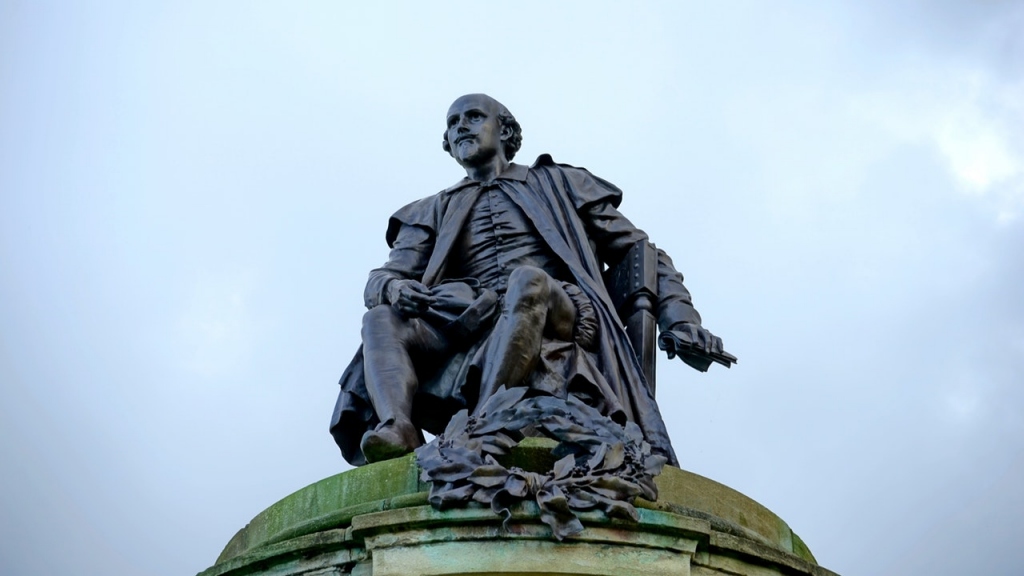It could be argued that the most interesting characters in Shakespeare’s play King Lear are also the most villainous. This is often the case in drama, but it may be even more so in this play, which is teeming with ripely villainous characters. There are Lear’s two daughters, Regan and Goneril, who turn upon their father like vipers as soon as they have enjoyed a taste of his power. There is the husband of Regan, Cornwall, who engages in the most physically memorable aspect of villainous behavior in the play when he gouges out Gloucester’s eyes. And, finally, there is Edmund, who is arguably the most interesting character in the entire play and who ably inhabits the role of the most villainous character in the world of King Lear.
Goneril is the first of the King Lear’s daughters to express to him the depths of her love. We quickly come to realize, however, that Goneril is hardly the loving daughter she desires to appear to be to her father in the first scene of the play. She issues the warrant that something must be done quickly to make sure that King Lear doesn’t possess the power to act as rashly with her and Regan as he did with Kent and Cordelia. To Regan’s advice that they think farther on it, Goneril states that it must be done in the heat of times. She acts quickly herself, thinking that her father is an old fool such as a baby and must therefore be treated with rebukes and not with the deference that he demands as king. Goneril turns villainous against her father in almost record time.
Goneril’s villainy takes a turn when she aligns herself with Edmund. She clearly sees Edmund as a future lover and her anger against her father quickly materializes into anger against both her husband and her sister as they are seen as objects in her way against a relationship with Edmund taking place. In the heat of passion, she takes a further step toward outright evil by committing murder when she poisons her very own sister.
At first blush, Regan seems less a villain than her sister. After all, she does suggest that they think carefully about what to do regarding their father whereas her sister Goneril is of the mind that any action must take place immediately. However, she quickly joins her sister in trying to find a way to get King Lear out of the way. She joins her sister in disabusing Lear of his train. She joins Goneril in pushing their elderly father out into the stormy night alone and without shelter or comfort, with the obvious intent of causing him mortal harm. These are not the actions of the woman who pledged her love to her father such a short time before. Regan is drawing nearer to Goneril’s level of evil when it comes to dealing with Gloucester. She takes an active part, urging on her husband to pluck out Gloucester’s other eye. This reeks of an evil spirit more at the forefront of her being than in allowing her father to roam wild in a raging storm as a sick and elderly man.
Regan, too, grows in villainy as a result of her lust for Edmund. Her husband dead merely minutes and she quickly begins to set her sights on taking the bastard as her lover. There is a lack of love in this woman, as well as in Goneril, that is astounding. They both by the end of the play seem equal to the task of serving as serviceable villainesses.
Regan’s husband, Cornwall, though a less interesting a character than his wife and sister-in-law, proves himself a capable villain in what may be the most memorable scene in the play, at least when watched in performance. Cornwall is steadfast in his loyalty to his wife and her designs on Lear. He commits one of the most flagrant acts of evil in Shakespeare’s entire canon. His gouging out of Gloucester’s eyes makes him an instant villain to remember. Not only does he do the deed, but he seems to get a perverse enjoyment out of doing it.
Edmund may well be one of the most interesting villains ever concocted by Shakespeare. We may not like it, but we can empathize somewhat with Edmund. Or, at the very least, we have more empathy for him than we do for either Goneril or Regan, who often seem to come across as just very bad daughters. Perhaps it is because Edmund has some of the best lines in the play, or because he has been blessed with such wit. Whatever the reason, Edmund comes across on paper as an actor’s dream role. His villainy is through and through and he will let nothing stand in his way, neither blood nor the object of his lustful admirings. He is the only villain in the play who directly addresses the audience concerning his motives. And, it could be argued, that his motives are not nearly as base as the other villains in the play. He almost make a somewhat convincing case that he has been wronged and that the laws of the land do stand in his way of getting what should justly be his. He plays his father like a Stradivarius in convincing the old man of Edgar’s evils. His most villainous moment may come when he walks away from Regan and Cornwall after they have specifically told him they intend to do harm to his father. He does not let this little matter deter him from his quest for power.
There are interesting heroes in King Lear, such as Edgar and Kent. The average reader or audience member of the play comes away, however, more likely remembering the villains than the heroes, especially Edmund for his deeply rounded portrait of an amoral man and Cornwall for his savage portrayal of a man willing to do anything to support his cause. The only character who may come close to being as memorable as the villains in the play is King Lear himself, and perhaps that is as it should be.
Source:

